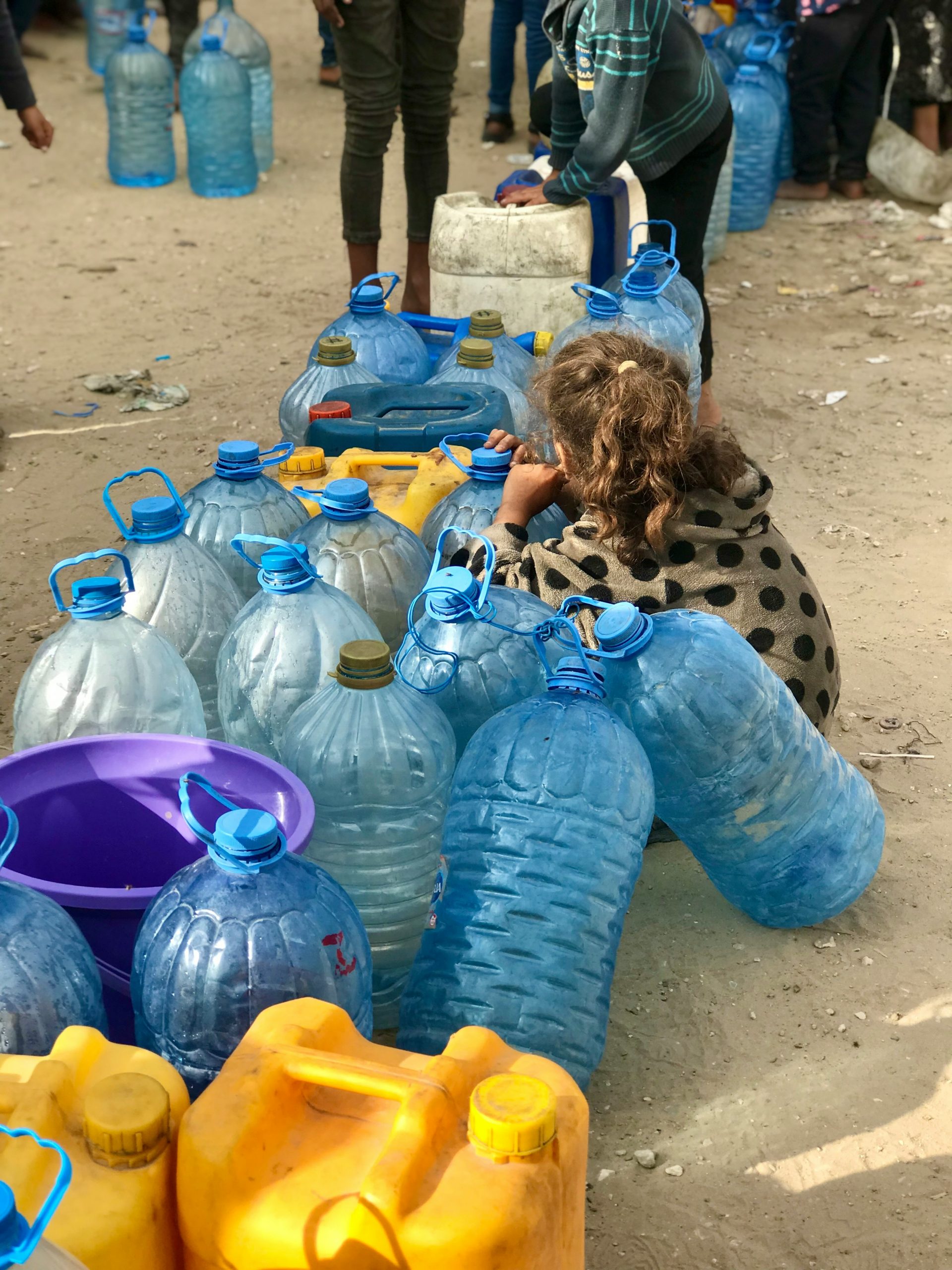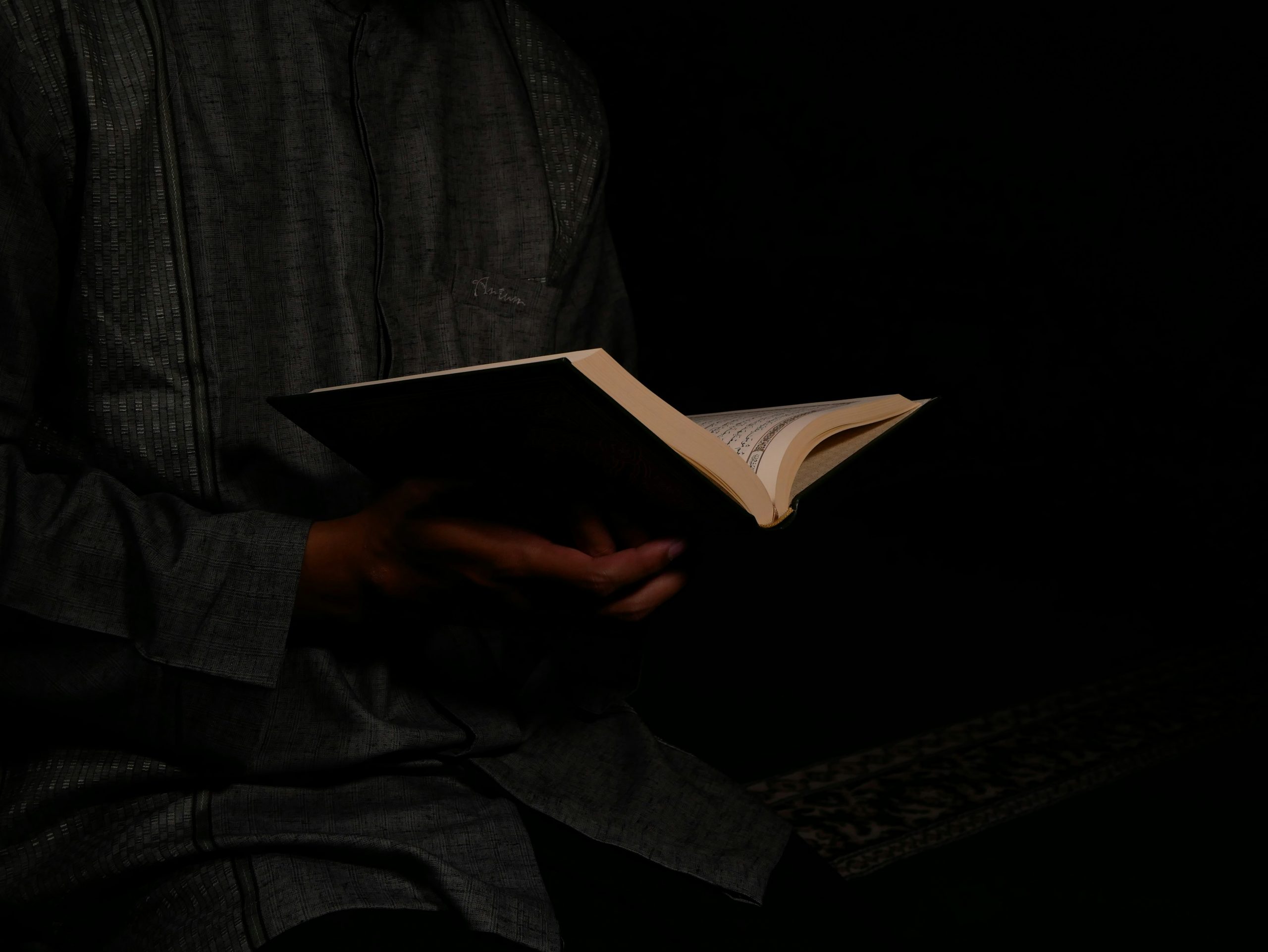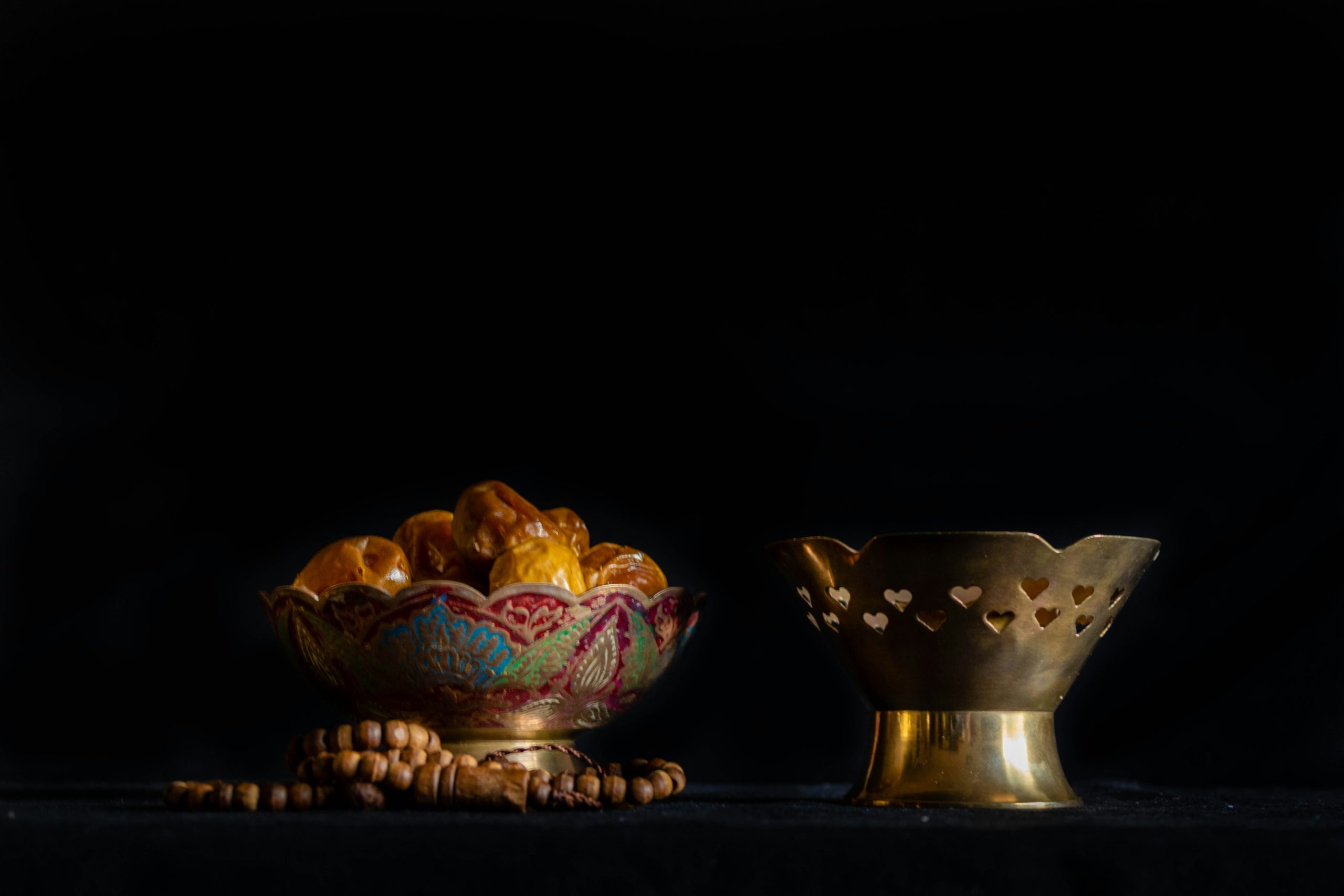A bitter, angry man encounters the object of his resentment at a Ramadan iftar, and is forced into a profound realization.
Familiar Sights
On my way to iftar, driving through the streets of the lower middle class Los Angeles barrio where I’d been raised, my eyes roamed over the familiar sights that I had missed for so long: the low-slung buildings and palm trees, mini-malls and donut shops, taquerias and churches. SubhanAllah, there was the little plaza where I’d learned to skateboard. That spot over there had been the heladería where Mamá used to take me, except it wasn’t an ice cream shop anymore, they’d torn it down and built a gourmet grocery store.
 There was the alley behind the community center where a group of Salvadoran toughs had robbed me and beaten me until I couldn’t walk. I fought back, and hurt a few of them, but they put me in the hospital. Except that now the community center was gone, replaced with pastel-colored condos, complete with a white lady in yoga pants walking her poodle. In fact, there were a lot more white people around than there used to be. My barrio was gentrifying.
There was the alley behind the community center where a group of Salvadoran toughs had robbed me and beaten me until I couldn’t walk. I fought back, and hurt a few of them, but they put me in the hospital. Except that now the community center was gone, replaced with pastel-colored condos, complete with a white lady in yoga pants walking her poodle. In fact, there were a lot more white people around than there used to be. My barrio was gentrifying.
I hadn’t ever wanted or expected to move back to the States, but my father had just celebrated his 75th birthday, and was no longer steady on his feet. My brothers and sisters were all busy or had moved away and didn’t want to return. I had a thriving career in London, not to mention a wife, but I loved my father, and I couldn’t leave him by himself. So here I was.
My wife Osaka had remained behind. She was a scientist working for a company that developed capture and harvesting solutions to remove microplastics from the environment. Her job was indispensable, and she was not willing to leave at this time. It was okay, we would work something out, inshaAllah. I loved her and she loved me. We’d been through hard times and had always overcome, by the will of Allah. We would figure it out.
Hard Times in London
I left this city fifteen years ago after a disastrous marriage engagement and breakup that had left me feeling like roadkill. Yasmin, the woman I was engaged to, broke up with me the day before the wedding, leaving me scrambling to inform the invitees and vendors, and with costs that could not be refunded. More than that, she left me deeply embarrassed, angry and humiliated.
So I did the only thing I could think of: sublet my apartment, said goodbye to my dad, put most of my personal belongings in his garage, packed a bag and flew across the sea to the UK, a location I picked with no forethought. I was a skilled photographer and was confident I could find work. For the first few years I lived in a dingy basement studio and survived on potatoes, beans and frozen fish fingers, as the Brits called them. I lived near a Sainsbury’s – a posh shop – and sometimes the more expensive food got remaindered, and I would treat myself to a whole guinea fowl for £2.50.
At the same time I agonized over the failure of my relationship with Yasmin. I knew that I had done everything I could. But still I was deeply depressed. In fact I felt like someone had reached inside me with a giant spoon and hollowed me out. I also harbored an intense hatred for Danya Nilson, the quack therapist Yasmin used to see, who I was convinced had turned her against me. I fantasized about what I would say to Nilson if I ever saw her again. How I would scald her with my words, then walk away. Or maybe I would snub her entirely, showing her how little I thought of her.
So I plunged myself into my work. I roamed London, taking candid photos of its inhabitants, exploring my new city through a camera lens. I was given a show in a gallery. I published selected photos in the newspapers and magazines. Eventually I worked my way up through the journalism ranks to become the senior photography editor at the Guardian, one of the best newspapers in the world.
Dodged An Artillery Shell
Along the way I met Osaka, a Japanese convert to Islam who became my wife. She was a tender, loving, kind woman – nothing like the negative-minded creature who’d dumped me – and yes, I was aware that I’d dodged not just a bullet but an artillery shell, and that everything had worked out for the best, alhamdulillah. I was truly grateful to Allah for pulling me out of the quicksand, even when I hadn’t known I was drowning.
Within a handful of years, Yasmin had faded to a sad memory, while I forgot Danya Nilson entirely. Life in London was good. My father came out to visit two or three times a year, and I took him around to the local masjids, Piccadilly Square, and a cruise on the Themes. Two Latinos exploring the most cosmopolitan city in the world. You couldn’t find decent Latin American cuisine in London if your life depended on it. but my father learned to love fish and chips.
There came a point when my father could not travel comfortably anymore, and now he had difficulty walking. So here I was, back in this sprawling city at the western edge of the world.
Converts’ Iftar
I’d been invited to this converts’ iftar at Masjid Al-Mu’mineen, the masjid that my father had co-founded and that I had practically grown up in. I was not actually a convert, as my Colombian father and Mexican mother had already been Muslim for ten years when I was born. But being Latino made me automatically a convert in some people’s eyes, plus I imagined a lot of people here still remembered me. I was excited to see my friends from the past. It would be strange, like meeting a group of friendly ghosts. If they asked me about the past – the breakup and all that – it would be fine, I would dismiss it with a word or two.
I wasn’t worried about running into Yasmin. Her life had gone from frying pan to fire, from what I’d heard. She’d moved away from L.A. and ended up cleaning houses in Alabama, apparently. One rumor said Yasmin had spent time in prison for bank fraud. It didn’t matter to me, I’d made my peace with it.
 I parked down the street from the masjid and walked toward it, carrying a tray of apple empanadas. I’d tried to convince my father to come to the iftar, but he had only recently begun relying on a cane to walk, and it embarrassed him, though he would not admit it. Typical Latino machismo.
I parked down the street from the masjid and walked toward it, carrying a tray of apple empanadas. I’d tried to convince my father to come to the iftar, but he had only recently begun relying on a cane to walk, and it embarrassed him, though he would not admit it. Typical Latino machismo.
I saw an African-American woman also walking toward the masjid, carrying three paper shopping bags. She was in her 60s and seemed familiar. As I watched, the handle on one bag tore, and strawberries spilled onto the sidewalk. I hurried to her, greeting her with the salam. Balancing my tray of empanadas on one hand, I picked up the strawberries, then cradled the bag in one arm.
“Amir Domínguez!” the woman exclaimed. “ Is that you?”
“Yes, Auntie Sarah.” She had been one of my mom’s friends when I was a kid.
“As I live and breathe. MashaAllah, mashaAllah. Are you here visiting your dad?”
“I’ve moved back, actually.”
“Allah bless you. Your dad’s a stubborn one, he’ll never admit he needs help.”
I chuckled. “I know it.”
“Is your wife here too? What’s her name again?”
“Osaka. No, not yet. We’re… figuring it out.”
We were almost at the door of the masjid when a woman’s voice called out, “As-salamu alaykum!” I looked over my shoulder – and felt my blood run cold. There was no mistaking that tall, thin form, those sharp Scandinavian features, and the trademark black turban that she wore piled on her head. It was Danya Nilson.
Fifteen Years Ago
My relationship with Yasmin was going downhill, and I knew it. In the beginning it had been so sweet and beautiful that when it turned sour, I couldn’t let go. I say “relationship,” but we were both practicing Muslims, so this consisted of me going shopping with her occasionally, accompanying her to events at the masjid, taking her and her son to the park, and so on. She told me she loved me, and she made me feel like I was king of the world. Most importantly, she prayed, she spoke the name of Allah often, and her voice was gentle and soothing.
Except when it wasn’t. I knew she was the product of a broken home, and I knew she had issues, but I did not care. Yasmin was smart and beautiful – very desirable – and I was blind. We were engaged to be married, and I was sure that once we were actually married, and I could hold her in my arms and soothe her fears and occasional fits of anger, all would be well. But the moments of sweetness and kindness became fewer and farther in between and were replaced with anger and sarcasm. She began expressing doubts about our future, and about me in particular. She shouted at me sometimes and ignored me at other times.
I noticed a pattern. Yasmin had a mentor, a Swedish immigrant named Danya Nilson, who was well known in the community as a self-proclaimed life coach and therapist. Nilson’s advice came from palm reading and “aura reading,” which involved holding one’s head in her hands and humming. Her therapies, from what Yasmin told me, included intense aromatherapy and sensory deprivation, for which she had an actual metal tank in her home. None of these therapies were cheap.
Yasmin believed in all of this completely. She probably spent a third of her monthly salary on Danya’s therapies. She wanted me to visit Danya with her and to go through the therapies as well. I refused. I didn’t put down Danya or her work. The palm reading was nonsense, but I wasn’t qualified to judge the validity of the other “therapies.” But I made it clear that it was not my cup of tea.
After that, I noticed that every time Yasmin visited Danya, her attitude took a turn for the worse. She invariably came back with odd criticisms of me that she had never expressed before:
“I’m concerned that your mother dying when you were young may have damaged your respect for femininity.”
Or, “You undoubtedly have PTSD from your rough childhood. How will that affect my son?”
Or, “Your patriarchal desire to possess me is concerning. I’m not an object for you to control.”
I couldn’t understand why my intelligent, loving fiance would let herself be brainwashed. I went to a few of the community elders and made inquiries. One, an African-American brother who had co-founded Al-Mu’mineen with my father, told me that Danya Nilson was well known for splitting couples apart. She herself had been married and divorced five times, and was now in a lesbian relationship.
The most damning assessment came from Auntie Sarah: “Danya is a fraud who preys on vulnerable women. She has your fiance under her thumb. Unless you submit to her as well, she will never allow Yasmin to marry you. She will poison her against you.”
I wish I had listened, but I spent another three months trying to fly a plane that had already lost its wings. I’m not proud of it.
I went to see Danya Nilson myself once. I told her that I was dedicated to Yasmin’s happiness, and that I wanted to get my relationship back on track. She asked me to be treated by her, and I said no. At that, Danya shook her head. “You men,” she sneered. “Darling, a woman’s sexual energy is more powerful than anything. It comes from mother earth, and amplifies the power of the earth’s core. The only thing men want is to control it. If you can’t do that, you try to destroy it. Well I won’t let you do that.”
I threw up my hands and walked away.
Two days before the wedding, Yasmin gave me an ultimatum: Be treated by Danya Nilson, or else. I refused, and told her not to worry, that once we were married all would be well. The next day she broke it off, and we never spoke again.
An Old Hate
When Danya Nilson called out her salam to me in front of the masjid, all the old hatred and resentment rushed back like cement into a mold, rooting me in place. All the old negativity and bitterness that I had forgotten, I now tasted in my mouth like acid. This woman had ruined my life, poisoned the woman I loved, and caused me years of heartache.
I stopped walking, paralyzed. What would I do? Would I cut her down verbally, as I had vowed in the past? Would I ignore her? I didn’t know what to do.
I had not wanted this. I had forgotten about this woman. It had not occurred to me that she might still be part of the community, and might even be here at Masjid Al-Mu’mineen. I did not need all this anger and resentment. I didn’t want it back. Yet, I realized now, I must have been carrying it all along, like a man with an unseen blood clot flowing through his veins, and he only finds out when it causes a stroke. I had never truly forgotten or forgiven.
Auntie Sarah took my arm and pulled me forward. “Don’t worry about her,” she said.
“As-salamu alaykum!” Danya called out, louder. Feeling like I had a golf ball in my throat, I did not reply, and I noticed that Sarah did not either. I dragged my feet.
“As-salamu alaykum!” It was a shout this time. Had she recognized me? Did she know I was ignoring her? Or was she simply indignant that some Muslim was ignoring her salam?
Which was something I could not continue to do. I had grown up attending Masjid Al-Mu’mineen Islamic school. I knew my religion, and I knew Allah’s instruction in the Quran, in Surat An-Nisaa:
“And when you are greeted, respond with a better greeting or at least similarly. Surely Allah is a ˹vigilant˺ Reckoner of all things.”
Returning the salam was an obligation. So I turned and replied, “Wa alaykum as-salam.”
I Know You
“Darling,” Nilson said. “Could you help me carry some things inside?”
“Let me set down the stuff I’m carrying,” I replied woodenly, “and I’ll be right back.”
I went into the masjid, which was already crowded, set down my empanadas and Auntie Sarah’s strawberries, and went back out. Standing beside the open trunk of her car, Danya Nilson indicated an ice chest. “Can you carry this?”
Standing this close to her, I saw that she had aged terribly. Yes, fifteen years had passed, and she must be about sixty or, but she seemed older. Her face was deeply lined, and while she had always been slender, now she seemed thin to the point of being frail.
She studied my face, then said, “I know you from somewhere.”
So she didn’t even remember me. I’d spent days and nights nursing my hate for her, and she didn’t know me. I lifted the ice chest, which was heavy, and lugged it inside.
When I set the ice chest down, Nilson touched my shoulder. “You’re Amir Domínguez.”
I simply looked at her. “Did you need anything else?”
She shook her head expressionlessly. “No, darling. Jazak Allah khayr.”
Oranges Like Candy
The seating and dining tables had been set up in the backyard. After fifteen years in London, eating outdoors seemed strange. But this was Los Angeles, where oranges grew like candy, and sunglasses were as important an accessory as shoes.
I looked around and saw many people I knew. I sat at a table with a group of brothers, some of whom were excited to see me, and some youth I did not know. We talked about fasting, the cost of real estate, and politics, but I was mostly silent. I was noticing something inside me: I felt lighter.
Part of me was chiding myself: Why had I replied to Danya Nilson’s salam, and why had I helped her? I had planned for years how I would spurn and humiliate her. Or at least tell her off to her face. Let her know how much pain she’d caused me. Yet when I’d had my chance, I had helped her carry an ice chest! What was the matter with me? Why was I such a wimp?
Another part of me, however, felt lighter, and not just a little, but a lot, as if I’d been carrying two heavy boulders on my back for years, and had just set one of them down.
 Plates of dates and quartered oranges were set on the tables. I made dua’, praying for my late mother, may Allah have mercy on her, as well as for my father’s health, my marriage, and the suffering brothers and sisters of the Ummah.
Plates of dates and quartered oranges were set on the tables. I made dua’, praying for my late mother, may Allah have mercy on her, as well as for my father’s health, my marriage, and the suffering brothers and sisters of the Ummah.
The adhan was called, and I helped myself to an orange piece, which was shockingly delicious. SubhanAllah. I ate another, and another, until I had eaten the equivalent of two oranges.
A Disturbing Sight
After salat I got two plates of food, one for me and one to take home to my dad. There was bottled water to drink, but I never drank out of plastic bottles. Microplastics from bottled water were being recognized as a major source of illness. I saw that Danya Nilson’s ice chest contained glass juice bottles. But I didn’t want anything from her.
I sat with the brothers. With the advent of nightfall the air had cooled. I had forgotten this about L.A., how the breeze could sweep in off the ocean at night and chill you like a popsicle. I had on a warm jacket – no self-respecting Londoner would go anywhere without an overcoat – but looking around, I saw something that disturbed me.
Danya Nilson sat at a table in the women’s area, alone. There were five or six tables for sisters, and all of them were nearly full, but Danya was alone. She wore no jacket, and she was visibly shivering with cold.
I felt my mouth go dry. I didn’t understand this. I knew that Nilson had at least five grown children, three of them girls. Where were they? And why was no one sitting with her? A sickly old woman in a gathering of at least thirty women, yet no one attended to her. Maybe people didn’t like her – after all, I myself hated her, right? But what about human decency?
I took my plate, went to Danya’s table and put my coat over her shoulders. Her head swiveled in surprise, and when she saw me her eyes went wide.
I sat down across from her at the table. We ate in silence for a few minutes.
An Awkward Conversation
“I heard you moved to Europe,” she said finally.
“The U.K.”
“Are you married?”
I debated with myself how to answer. I didn’t want to be rude, but I also didn’t want to give her too much information. In the end I simply said, “Yes.”
“Alhamdulillah, that’s good.” She smiled. “I’m glad for you.”
“Brother Amir,” she said after another minute. “Could you be a darling and fetch me one of those organic juice bottles I brought? And one for yourself too.”
I didn’t much care for the word fetch, but I did so. The juice was very good. Uncomfortable with the silence, I asked about her children. She told me frankly that her eldest son had been killed in a shooting. Another son was in prison. One daughter had become a pediatrician and lived in San Francisco. Another daughter had left Islam and become a Wiccan priestess, of all things. The youngest daughter still lived at home and was doing a Masters at UCLA.
We did not talk about Yasmin at all.
Light as Birdsong
Another sister finally appeared and sat beside Nilson and began to chat with her. Feeling tremendously relieved, I left Nilson with my coat and excused myself, taking the plate of food I’d made for my dad, and another plate of desserts I scooped up for both of us.
Sitting in my car, I found my hands shaking. Even my breath was ragged. I felt so light, as light as birdsong, as light as the wind through the trees, as light as moonbeams. I felt as if I would float away. It shocked me.
There was a story I’d heard many years ago, and I remembered it now:
The Man From Paradise
In the blessed days of Madinah, the Prophet Muhammad ﷺ once sat with his companions when he made a striking statement:
“A man from the people of Paradise will now enter.”
All eyes turned to the entrance of the mosque. A man from the Ansar appeared, his beard still wet from ablution, his sandals in his left hand. He looked ordinary, not someone known for exceptional acts of worship. Yet, the Prophet ﷺ had just testified to his place in Paradise.
The following day, at a similar gathering, the Prophet ﷺ made the same declaration:
“A man from the people of Paradise will now enter.”
Once again, it was the same man.
And again, on the third day:
“A man from the people of Paradise will now enter.”
And again, the same man.
Among those who had witnessed this repeated testimony was Abdullah ibn Amr ibn al-As, a companion known for his devotion and pursuit of knowledge. He was intrigued, even restless. What was it about this man that earned him such a lofty station—Paradise, confirmed by the Prophet himself—while others, who fasted and prayed long into the night, were never singled out in such a way? Determined to find out, Abdullah approached the man after the gathering.
“I had a disagreement with my father,” he said, “and I swore not to return home for three nights. Would you allow me to stay with you during that time?”
The man agreed, and Abdullah became his quiet guest.
For three days and nights, Abdullah observed everything. He watched the man pray. He joined him for meals. He stayed awake to see if the man rose in the night for extra prayers, or spent long hours in remembrance. But nothing stood out. The man prayed the obligatory prayers, performed no exceptional fasts, and spoke little. His life was simple, sincere, and seemingly unremarkable.
Finally, Abdullah revealed the real reason for his visit. He told the man about the Prophet’s repeated testimony, and confessed his own curiosity.
“I have seen nothing extraordinary in your deeds,” he admitted. “So what is it? What is the secret that earned you the Prophet’s praise and the promise of Paradise?”
The man thought for a moment. Then he said,
“What you have seen is all there is. But there is one thing I do every night: Before I sleep, I forgive anyone who has wronged me. I cleanse my heart of hatred, envy, and resentment. I do not bear ill will toward any Muslim. I ask Allah to purify my heart before I rest.”
Abdullah ibn Amr smiled. “That,” he said, “is what we (the rest of us) cannot do.”
This is Ramadan

I had known this story for much of my life, but suddenly it hit home in a way it never had. In that moment, sitting there in the car, I understood why this practice of nightly forgiveness had made that man one of the people of Jannah. Hatred and resentment are the enemies of iman. The two are opposites, they cannot both thrive in the same soul.
Yet true forgiveness is so hard. We hold onto our grudges like secret treasures. As if letting them go would cost us something. When the reality was the opposite.
I did not imagine that Nilson was now my friend. It wasn’t about that. I had set down something intolerably heavy. I’d been cleansed of a poison that had settled in the tissues of my body like arsenic.
This is what Ramadan is, I thought. I had experienced many Ramadans, some better than others, but never before had I felt what I did at this moment, that by simply talking to an old woman and putting my coat around her shoulders, I was living Ramadan in the realest way, maybe for the first time in my life.
This is what Ramadan is. Not hunger and thirst, not eating suhur and iftar at a certain time, praying at night, and so on. Yes, those things were important, but if I couldn’t purify my soul, then what was I doing? If I couldn’t change, then what was my ibadah for?
I rubbed my face. I imagined that this experience might seem small and silly to someone else. But I felt shaken. I felt I’d had a moment of huda, of profound guidance.
Someone knocked on my window, startling me. It was Nilson.
“Darling,” she said. “You forgot your jacket.”
I rolled down the window and took it, thanking her, and she walked away. I started the car and pulled out with the window open. The cold Pacific breeze whipped my hair, waking me up. The streetlights had come on, and the moon was low and full in the eastern sky.
THE END
Reader comments and constructive criticism are important to me, so please comment!
See the Story Index for Wael Abdelgawad’s other stories on this website.

Wael Abdelgawad’s novels – including Pieces of a Dream, The Repeaters and Zaid Karim Private Investigator – are available in ebook and print form on his author page at Amazon.com.
Related:
My Best Ramadan – Four Stories Of Ramadans Past
A Hassan’s Tale Story: No Strings On Me
The post As Light As Birdsong: A Ramadan Story appeared first on MuslimMatters.org.
than the wealthy who abandon devotion in the name of modernity.

 Mercy in these final nights, have we shown mercy to those who need it the most?
Mercy in these final nights, have we shown mercy to those who need it the most?








 . When Allah
. When Allah 





 “Those who have believed and whose hearts are assured by the remembrance of Allah. Unquestionably, by the remembrance of Allah hearts are assured.” [Surah Ar-Ra’d: 13;28]
“Those who have believed and whose hearts are assured by the remembrance of Allah. Unquestionably, by the remembrance of Allah hearts are assured.” [Surah Ar-Ra’d: 13;28]